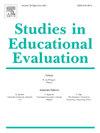为提高国际大规模评估的跨国可比性而进行的路线优化关键评价
IF 2.6
2区 教育学
Q1 EDUCATION & EDUCATIONAL RESEARCH
引用次数: 0
摘要
本研究批判性地考察了对齐优化的使用,以提高2018年教与学国际调查(TALIS)中教师和校长量表的跨国可比性。通过研究心理测量的关键属性,包括维度、可靠性和测量不变性,本研究强调了国际大规模评估的关键挑战。虽然所有量表都建立了单维性和高度内部一致性,但传统的多组验证性因子分析(MGCFA)表明,大多数量表不能完全建立标量不变性,这引起了人们对严格不变性假设下跨国比较的稳健性的担忧。相比之下,对准优化作为一种灵活且稳健的方法,显著提高了所有满足对准标准的主尺度的可比性。然而,对于许多教师量表来说,存在着持续的挑战,这些挑战低于一致性阈值,强调了尚未解决的方法复杂性。本研究展示了校准优化在全球教育研究中推进心理测量严谨性的变革潜力,并强调了解决国际评估中挥之不去的可比性问题的创新方法的必要性。本文章由计算机程序翻译,如有差异,请以英文原文为准。
A critical evaluation of alignment optimization for improving cross- national comparability in international large-scale assessments
This study critically examines the use of alignment optimization to improve cross-national comparability of teacher and principal scales from the Teaching and Learning International Survey (TALIS) 2018. By investigating key psychometric properties, including dimensionality, reliability, and measurement invariance, the study highlights critical challenges in international large-scale assessments. While unidimensionality and high internal consistency were established for all scales, traditional multiple-group confirmatory factor analysis (MGCFA) suggested that scalar invariance could not be fully established for most scales, raising concerns about the robustness of cross-national comparisons under strict invariance assumptions. In contrast, alignment optimization emerged as a flexible and robust method, significantly enhancing the comparability of principal scales, all of which met alignment criteria. However, persistent challenges were identified for many teacher scales, which fell below alignment thresholds, emphasizing unresolved methodological complexities. This study demonstrates the transformative potential of alignment optimization for advancing psychometric rigor in global educational research and underscores the need for innovative approaches to address lingering comparability issues in international assessments.
求助全文
通过发布文献求助,成功后即可免费获取论文全文。
去求助
来源期刊

Studies in Educational Evaluation
Multiple-
CiteScore
6.90
自引率
6.50%
发文量
90
审稿时长
62 days
期刊介绍:
Studies in Educational Evaluation publishes original reports of evaluation studies. Four types of articles are published by the journal: (a) Empirical evaluation studies representing evaluation practice in educational systems around the world; (b) Theoretical reflections and empirical studies related to issues involved in the evaluation of educational programs, educational institutions, educational personnel and student assessment; (c) Articles summarizing the state-of-the-art concerning specific topics in evaluation in general or in a particular country or group of countries; (d) Book reviews and brief abstracts of evaluation studies.
 求助内容:
求助内容: 应助结果提醒方式:
应助结果提醒方式:


